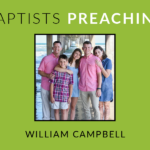Joan Ruth Bader was born in Brooklyn, New York, on March 15, 1933. She met Martin Ginsburg on a blind date when they were undergraduates at Cornell. The couple had a daughter, Jane, and a son, James.
She became a Supreme Court Justice in 1993, serving for 27 years before her death last Friday at the age of 87.
I’d like to focus on Justice Ginsburg’s life and influence in the context of one of the most famous chapters in Scripture.
Here, we discover a life principle she illustrates and our Lord commends to us.
“A Prayer of Moses, the man of God”
Psalm 90 is titled “A Prayer of Moses, the man of God.” It was apparently written as the Jewish people were preparing to enter Canaan together.
Moses led them from Egyptian slavery through the Red Sea and 40 years in the wilderness. He gave them the Ten Commandments and the rest of the Torah as God’s word and guidance for their lives and nation. He brought them through battles, rebellions and hardships to the edge of their future in the land God intended for them.
If we had met Moses 40 years earlier, however, we never would have imagined the last paragraph would be possible.
A fugitive from Egyptian justice, he was keeping his father-in-law’s sheep in the wilderness. When God appeared to him and called him to liberate his people, Moses’ reply showed his astonishment: “Who am I that I should go to Pharaoh and bring the children of Israel out of Egypt?” (Exodus 3:11).
But God had a plan for his life that Moses could not imagine at the time.
Sign up for our weekly edition and get all our headlines in your inbox on Thursdays
“Our nation has lost a justice of historic stature”
Ginsburg received her Bachelor of Arts degree from Cornell and attended Harvard Law School, where she was the first woman to serve on the editorial staff of the law review. When her husband got a job in New York, she finished her law degree at Columbia Law School, where she tied for first in her class.
After graduation, however, she struggled to find employment. One of her Columbia professors intervened on her behalf, and she got a job as a law clerk from 1959 to 1961.
She became a professor of law at Rutgers (1963–72) and Columbia (1972–80). She was instrumental in launching the Women’s Rights Project of the American Civil Liberties Union in 1971; she served as the ACLU’s general counsel from 1973 to 1980 and on the national board of directors from 1974 to 1980.
She was appointed a judgeship on the U.S. Court of Appeals for the District of Columbia in 1980. President Bill Clinton nominated her to the U.S. Supreme Court on June 14, 1993; she was confirmed by the Senate on August 3 and took her seat on August 10. She became the second female and first Jewish female justice of the court.
After her death, Chief Justice John Roberts stated, “Our nation has lost a justice of historic stature.”
Known as a “lioness of the law,” she became a cultural icon, inspiring T-shirts, a character on Saturday Night Live, an Oscar-nominated documentary, and a major studio motion picture about her early legal career.
According to one legal scholar, her work as an attorney decades before joining the court “fundamentally changed the Supreme Court’s approach to women’s rights.”
Writing for the New Yorker, Harvard professor Jill Lepore stated: “Ginsburg bore witness to, argued for, and helped to constitutionalize the most hard-fought and least-appreciated revolution in modern American history: the emancipation of women. Aside from Thurgood Marshall, no single American has so wholly advanced the cause of equality under the law.”
“Suddenly a wall becomes a gate”
I disagreed with Justice Ginsburg on a host of biblical issues, but I’m grateful for the way she inspired generations of women to know they can accomplish their dreams. Like Moses, you and I are created in God’s image (Genesis 1:27) with a unique role he intends for us in the drama he is directing through the ages.
Our part in this drama is a present-tense calling with present-tense urgency. However long we live, our years “are soon gone, and we fly away” (Psalm 90:10). As a result, we must pray, “Teach us to number our days that we may get a heart of wisdom” (v. 12). Each day takes us one day closer to eternity.
It is significant that the first female Jewish Supreme Court justice died on the first day of Rosh Hashanah, the Jewish New Year, which is seen by Jews all over the world as a day for new beginnings.
The fact you and I are alive on this Monday morning is evidence God has a plan and purpose for us. Each day is a new beginning in which we are invited to know our Lord and make him known with greater passion and purpose than ever before.
Then, when our last day in this world comes, Christians can know our death is only the doorway to life. As Jesus said, “Everyone who lives and believes in me shall never die” (John 11:26).
Henri Nouwen was right: “Death is part of a much greater and much deeper event, the fullness of which we cannot comprehend, but of which we know that it is a life-bringing event. … What seemed to be the end proved to be the beginning; what seemed to be a cause for fear proved to be a cause for courage; what seemed to be defeat proved to be victory; and what seemed to be the basis for despair proved to be the basis for hope. Suddenly a wall becomes a gate.”
Are you ready to step through that gate today? If not, why not?
Jim Denison is the co-founder and chief vision officer of Denison Forum. He pastored churches in Texas and Georgia and now speaks and writes to empower believers to navigate cultural issues from a biblical perspective.
The death of Ruth Bader Ginsburg and our unique role in God’s drama of the ages was first published in The Daily Article by the Denison Forum. Daily Articles are republished in the Baptist Standard under agreement with Denison Forum and are not intended to represent the Standard’s views.















We seek to connect God’s story and God’s people around the world. To learn more about God’s story, click here.
Send comments and feedback to Eric Black, our editor. For comments to be published, please specify “letter to the editor.” Maximum length for publication is 300 words.